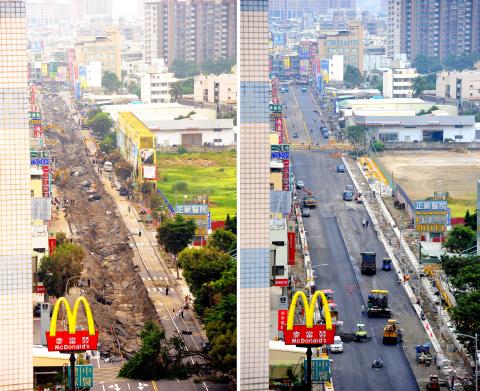Repairs have been completed on roads in Greater Kaohsiung damaged in the gas pipeline explosions on July 31 and the early hours of the next day and they were opened to the public at midnight yesterday morning.
The disaster caused by gas leaks claimed 30 lives and injured more than 300 people.
Residents of the area were emotional after seeing the newly paved roads and the roadblocks being removed.

Photos: Chang Chung-yi, Taipei Times
One man, surnamed Chang (張), said the area had looked like a warzone on Aug. 1 and three months later it looked as if nothing had changed.
Many of the drivers directed by traffic police were hesitant as they neared the streets, asking police officers if the road was actually clear.
A couple crossing the repaved intersection of Ersheng and Kaisyuan roads pointed to the pavement under their feet and said: “That very box culvert, that had a leak that caused the explosions, and the propene pipeline was right here.”
“Though it has only been a few months for the rest of the nation, people in the affected areas feel like it has been years since the explosions,” the husband, surnamed Yang (楊), said.
“I felt sadness welling up within me when I went past the crossing,” he said.
Meanwhile, in response to allegations that the road repairs had been completed just in time for next Saturday’s nine-in-one elections in an attempt to garner votes, Greater Kaohsiung Mayor Chen Chu (陳菊) said the decision to allow traffic to pass through the affected areas had nothing to do with the elections.
The explosions were one of the greatest disasters to hit Greater Kaohsiung in the past 50 years, Chen said, adding that the hard work the Greater Kaohsiung Government had put into the repairs was so that residents could resume their daily lives and would not have to take an alternate route when going to work or school.
No one could have predicted the gas explosions would occur prior to elections and the repairs had not been rushed especially for the elections, Chen said, adding that the repairs were “top quality.”
Greater Kaohsiung Maintenance Office Director Chao Chien-chiao (趙建喬) said the original plan was to allow the public access to the affected areas by Thursday and finish all of the repairs by Dec. 20.
The office is set to begin work on the sidewalks and the office hopes that store owners will be as accommodating as they have been up until now, as the repairs are likely to be quite noisy, Chao said.

An essay competition jointly organized by a local writing society and a publisher affiliated with the Chinese Communist Party (CCP) might have contravened the Act Governing Relations Between the People of the Taiwan Area and the Mainland Area (臺灣地區與大陸地區人民關係條例), the Mainland Affairs Council (MAC) said on Thursday. “In this case, the partner organization is clearly an agency under the CCP’s Fujian Provincial Committee,” MAC Deputy Minister and spokesperson Liang Wen-chieh (梁文傑) said at a news briefing in Taipei. “It also involves bringing Taiwanese students to China with all-expenses-paid arrangements to attend award ceremonies and camps,” Liang said. Those two “characteristics” are typically sufficient

A magnitude 5.9 earthquake that struck about 33km off the coast of Hualien City was the "main shock" in a series of quakes in the area, with aftershocks expected over the next three days, the Central Weather Administration (CWA) said yesterday. Prior to the magnitude 5.9 quake shaking most of Taiwan at 6:53pm yesterday, six other earthquakes stronger than a magnitude of 4, starting with a magnitude 5.5 quake at 6:09pm, occurred in the area. CWA Seismological Center Director Wu Chien-fu (吳健富) confirmed that the quakes were all part of the same series and that the magnitude 5.5 temblor was

The brilliant blue waters, thick foliage and bucolic atmosphere on this seemingly idyllic archipelago deep in the Pacific Ocean belie the key role it now plays in a titanic geopolitical struggle. Palau is again on the front line as China, and the US and its allies prepare their forces in an intensifying contest for control over the Asia-Pacific region. The democratic nation of just 17,000 people hosts US-controlled airstrips and soon-to-be-completed radar installations that the US military describes as “critical” to monitoring vast swathes of water and airspace. It is also a key piece of the second island chain, a string of

The Central Weather Administration has issued a heat alert for southeastern Taiwan, warning of temperatures as high as 36°C today, while alerting some coastal areas of strong winds later in the day. Kaohsiung’s Neimen District (內門) and Pingtung County’s Neipu Township (內埔) are under an orange heat alert, which warns of temperatures as high as 36°C for three consecutive days, the CWA said, citing southwest winds. The heat would also extend to Tainan’s Nansi (楠西) and Yujing (玉井) districts, as well as Pingtung’s Gaoshu (高樹), Yanpu (鹽埔) and Majia (瑪家) townships, it said, forecasting highs of up to 36°C in those areas